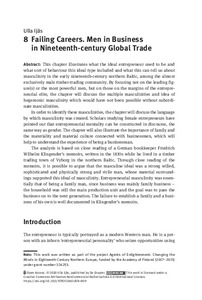Failing Careers. Men in Business in Nineteenth-century Global Trade
Ulla Ijäs
https://urn.fi/URN:NBN:fi-fe2021042825256
Tiivistelmä
This chapter illustrates what the ideal entrepreneur used to be and what sort of behaviour this ideal type included and what this can tell us about masculinity in the early nineteenth-century northern Baltic, among the almost exclusively male timber-trading community. By focusing not on the leading figure( s) or the most powerful men, but on those on the margins of the entrepreneurial elite, the chapter will discuss the multiple masculinities and idea of hegemonic masculinity which would have not been possible without subordinate masculinities. In order to identify these masculinities, the chapter will discuss the language by which masculinity was created. Scholars studying female entrepreneurs have pointed out that entrepreneurial mentality can be constructed in discourse, the same way as gender. The chapter will also illustrate the importance of family and the materiality and material culture connected with businessmen, which will help to understand the experience of being a businessman. The analysis is based on close reading of a German bookkeeper Friedrich Wilhelm Klingender’s memoirs, written in the 1830s while he lived in a timber trading town of Vyborg in the northern Baltic. Through close reading of the memoirs, it is possible to argue that the masculine ideal was a strong willed, sophisticated and physically strong and virile man, whose material surroundings supported this ideal of masculinity. Entrepreneurial masculinity was essentially that of being a family man, since business was mainly family business - the household was still the main production unit and the goal was to pass the business on to the next generation. The failure to establish a family and a business of his own is well documented in Klingender’s memoirs.
Kokoelmat
- Rinnakkaistallenteet [19207]
